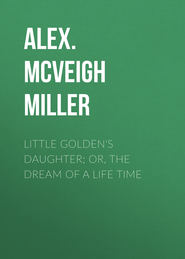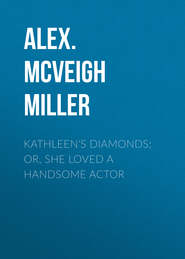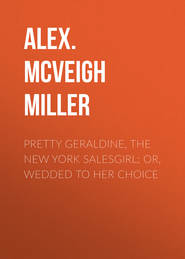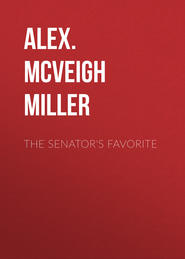По всем вопросам обращайтесь на: info@litportal.ru
(©) 2003-2024.
✖
Lancaster's Choice
Автор
Год написания книги
2018
Настройки чтения
Размер шрифта
Высота строк
Поля
She regarded the handsome, insubordinate face in dead silence a minute.
"You already anticipate what I would say," she said. "Why is the idea so distasteful to you, Clive? Any young man in your position might be transported with joy at the thought of inheriting my fortune."
He bowed silently.
"You know," she went on, coolly, "you can never come home to live on your ancestral acres unless you marry money or inherit it."
"Thanks to the folly of my predecessors," he said, bitterly.
"Never mind your predecessors, Clive. There is a woman here whom I want you to marry. Win her and make her mistress of Lancaster Park, and my fortune is yours."
"Am I to have her for the asking?" he inquired, with a delicate sarcasm.
"It is very likely you may," she answered. "Handsome faces like yours make fools of most women."
"And who is the lady it is to charm in this case?" he inquired, with bitter brevity.
"It is the Lady Adela Eastwood," she replied, concisely.
He gave a low whistle of incredulity.
"The Lady Adela Eastwood—the daughter of a hundred earls!" he cried. "Your ambition soars high, Aunt Lydia."
"Not too high," she replied, shaking her old head proudly, until the great red jewels in her ears flashed like drops of blood.
CHAPTER XX
"Not too high," repeated Lady Lancaster, sagely. "The lords of Lancaster have married earls' daughters before to-day."
"Yes, in their palmy days," said Clive Lancaster; "but not now, when their patrimony is wasted, their lands encumbered with taxes, and their last descendant earning a paltry living in her majesty's service."
"Lady Adela is as poor as you are," said the withered old woman, significantly.
"No?"
"Yes."
"But I thought that the Earl of Eastwood was very rich."
"He was once; but he and his spendthrift sons have made ducks and drakes of the money at the gaming-table. Lady Adela will have no portion at all. She will be compelled to marry a fortune."
"So you have placed yours at her disposal?" he said, with hardly repressed scorn.
"Yes," coolly, "if she takes my nephew with it. But, seriously, Clive, it is the best match for you both. You will have money; she has beauty and exalted station. Married to each other, you two will be a power in the social world; apart, neither of you will count for much. You will have rank, but that will be a mere incumbrance to you without the ability to sustain its dignity properly."
"If you only knew how little I care for social power," he said. "The life of a soldier suits me. I have no great ambition for wealth and power."
"You are no true Lancaster if you are willing to let the old name and the old place run down!" she broke out, indignantly. "Ah, I wish that I might have borne a son to my husband! Then this degenerate scion of a noble race need never have been roused from his dolce far niente to sustain its ancient glory."
His lip curled in cold disdain of her wild ranting.
"At least the old name will never be dishonored by me," he said. "I have led a life that no one can cry shame upon. My record is pure."
Glancing at his flushed face and proud eyes, she saw that she had gone too far. She did not want to rouse that defiant mood inherent in all the Lancasters. She was afraid of it.
"I was hasty," she said. "Forgive me, Clive. But I am so anxious to have you fall in with my plans. I have no kin of my own, and I am anxious to leave my money to you, the heir of my late husband's title. If you fall in with my views I shall give you from the day of your marriage ten thousand a year, and after my death the whole income shall be yours. If you cross me, if you decline to marry as I wish you to do, I shall hunt up other Lancasters—there are distant connections in London, I think—and I shall leave everything to them instead of to you."
Her black eyes glittered with menace, and there was an evil, triumphant smile on her thin, cruel lips. She knew the extent of her power, and was bent on using it to the full.
"Money is a good thing to have, Aunt Lydia. I should like to have yours when you are done with it, I don't deny that," he said. "There may be some things better than money, if," slowly, "one could have them, but—"
"Better than money?" she interrupted, angry and sarcastic, and frightened all at once, for fear that he was about to refuse her. "Pray tell me what those desirable things may be."
"You did not hear me out," he answered, calmly. "I was about to say there might be, but I was not sure. We will not discuss that unknown quantity."
"I think not," she answered, dryly. "It might be more pertinent to discuss Lady Adela now. What do you say, Clive? Shall you pay your court to her?"
A deep red flushed all over his fair, handsome face.
"She might decline the honor," he said.
"Pshaw! she might be a fool, but she isn't," said my lady, sharply. "She will not decline. She has an inkling of what I mean to do. I have talked with the earl. He thinks it would be a pleasant and pertinent arrangement for the house of Lancaster. You know you have to think of your heirs, Clive, and to do the best you can for their future."
"Yes," he said, sarcastically.
"Well, now I have told you all my hopes and plans, Clive, I want to know what you are going to do. There is no use beating about the bush," said my lady, sharply.
"I am going to make Lady Adela's acquaintance before I make up my mind," he answered, undauntedly.
"You will fall in love with her. She is a great beauty," my lady said, confidently, as he bowed himself out.
CHAPTER XXI
That evening when "sober-suited twilight" had begun to fall over all things, when the stars began to sparkle in the sky, when the air began to be heavy with odors of rose and mignonette and jasmine and the odorous, heavy-scented honeysuckle, Mrs. West came into the sitting-room, where Leonora was leaning from the window, drinking in the peaceful sweetness of the summer eve.
"Are you lonely here in the dark, my dear? I will bring a lamp," she said.
"Not yet, please, Aunt West," said the girl. "I love this twilight dimness. I love to sit in the darkness and think."
"About your poor papa, dear?" asked the good woman. "Tell me about him, Leonora. What did he die of?"
"It was a fever, Aunt West. Some day I will tell you all about him, but not just yet, please. I—can not bear it yet. It has been so little a while since I lost him—barely two months!" said Leonora, with the sound of tears in her voice.
"Well, well, dear, I did not think. You shall tell me when you please. But that was not what I came for. You know I promised you a peep at the fine folks when they dined. Well, it is time now. In a minute they will assemble. Come with me; I have found a snug place for you."
Leonora rose and followed her aunt. They went along some dark corridors, hand in hand, silently, and then Mrs. West put a key softly into a lock and turned it. A door opened. A close, musty scent of dust and disuse breathed in their faces. Mrs. West drew Leonora in and shut the door.
"Do not be afraid of the dark, dear," she whispered. "It is only a disused china-closet opening on the dining-hall. There is a broken panel. This way, Leonora. Now, look."
"You already anticipate what I would say," she said. "Why is the idea so distasteful to you, Clive? Any young man in your position might be transported with joy at the thought of inheriting my fortune."
He bowed silently.
"You know," she went on, coolly, "you can never come home to live on your ancestral acres unless you marry money or inherit it."
"Thanks to the folly of my predecessors," he said, bitterly.
"Never mind your predecessors, Clive. There is a woman here whom I want you to marry. Win her and make her mistress of Lancaster Park, and my fortune is yours."
"Am I to have her for the asking?" he inquired, with a delicate sarcasm.
"It is very likely you may," she answered. "Handsome faces like yours make fools of most women."
"And who is the lady it is to charm in this case?" he inquired, with bitter brevity.
"It is the Lady Adela Eastwood," she replied, concisely.
He gave a low whistle of incredulity.
"The Lady Adela Eastwood—the daughter of a hundred earls!" he cried. "Your ambition soars high, Aunt Lydia."
"Not too high," she replied, shaking her old head proudly, until the great red jewels in her ears flashed like drops of blood.
CHAPTER XX
"Not too high," repeated Lady Lancaster, sagely. "The lords of Lancaster have married earls' daughters before to-day."
"Yes, in their palmy days," said Clive Lancaster; "but not now, when their patrimony is wasted, their lands encumbered with taxes, and their last descendant earning a paltry living in her majesty's service."
"Lady Adela is as poor as you are," said the withered old woman, significantly.
"No?"
"Yes."
"But I thought that the Earl of Eastwood was very rich."
"He was once; but he and his spendthrift sons have made ducks and drakes of the money at the gaming-table. Lady Adela will have no portion at all. She will be compelled to marry a fortune."
"So you have placed yours at her disposal?" he said, with hardly repressed scorn.
"Yes," coolly, "if she takes my nephew with it. But, seriously, Clive, it is the best match for you both. You will have money; she has beauty and exalted station. Married to each other, you two will be a power in the social world; apart, neither of you will count for much. You will have rank, but that will be a mere incumbrance to you without the ability to sustain its dignity properly."
"If you only knew how little I care for social power," he said. "The life of a soldier suits me. I have no great ambition for wealth and power."
"You are no true Lancaster if you are willing to let the old name and the old place run down!" she broke out, indignantly. "Ah, I wish that I might have borne a son to my husband! Then this degenerate scion of a noble race need never have been roused from his dolce far niente to sustain its ancient glory."
His lip curled in cold disdain of her wild ranting.
"At least the old name will never be dishonored by me," he said. "I have led a life that no one can cry shame upon. My record is pure."
Glancing at his flushed face and proud eyes, she saw that she had gone too far. She did not want to rouse that defiant mood inherent in all the Lancasters. She was afraid of it.
"I was hasty," she said. "Forgive me, Clive. But I am so anxious to have you fall in with my plans. I have no kin of my own, and I am anxious to leave my money to you, the heir of my late husband's title. If you fall in with my views I shall give you from the day of your marriage ten thousand a year, and after my death the whole income shall be yours. If you cross me, if you decline to marry as I wish you to do, I shall hunt up other Lancasters—there are distant connections in London, I think—and I shall leave everything to them instead of to you."
Her black eyes glittered with menace, and there was an evil, triumphant smile on her thin, cruel lips. She knew the extent of her power, and was bent on using it to the full.
"Money is a good thing to have, Aunt Lydia. I should like to have yours when you are done with it, I don't deny that," he said. "There may be some things better than money, if," slowly, "one could have them, but—"
"Better than money?" she interrupted, angry and sarcastic, and frightened all at once, for fear that he was about to refuse her. "Pray tell me what those desirable things may be."
"You did not hear me out," he answered, calmly. "I was about to say there might be, but I was not sure. We will not discuss that unknown quantity."
"I think not," she answered, dryly. "It might be more pertinent to discuss Lady Adela now. What do you say, Clive? Shall you pay your court to her?"
A deep red flushed all over his fair, handsome face.
"She might decline the honor," he said.
"Pshaw! she might be a fool, but she isn't," said my lady, sharply. "She will not decline. She has an inkling of what I mean to do. I have talked with the earl. He thinks it would be a pleasant and pertinent arrangement for the house of Lancaster. You know you have to think of your heirs, Clive, and to do the best you can for their future."
"Yes," he said, sarcastically.
"Well, now I have told you all my hopes and plans, Clive, I want to know what you are going to do. There is no use beating about the bush," said my lady, sharply.
"I am going to make Lady Adela's acquaintance before I make up my mind," he answered, undauntedly.
"You will fall in love with her. She is a great beauty," my lady said, confidently, as he bowed himself out.
CHAPTER XXI
That evening when "sober-suited twilight" had begun to fall over all things, when the stars began to sparkle in the sky, when the air began to be heavy with odors of rose and mignonette and jasmine and the odorous, heavy-scented honeysuckle, Mrs. West came into the sitting-room, where Leonora was leaning from the window, drinking in the peaceful sweetness of the summer eve.
"Are you lonely here in the dark, my dear? I will bring a lamp," she said.
"Not yet, please, Aunt West," said the girl. "I love this twilight dimness. I love to sit in the darkness and think."
"About your poor papa, dear?" asked the good woman. "Tell me about him, Leonora. What did he die of?"
"It was a fever, Aunt West. Some day I will tell you all about him, but not just yet, please. I—can not bear it yet. It has been so little a while since I lost him—barely two months!" said Leonora, with the sound of tears in her voice.
"Well, well, dear, I did not think. You shall tell me when you please. But that was not what I came for. You know I promised you a peep at the fine folks when they dined. Well, it is time now. In a minute they will assemble. Come with me; I have found a snug place for you."
Leonora rose and followed her aunt. They went along some dark corridors, hand in hand, silently, and then Mrs. West put a key softly into a lock and turned it. A door opened. A close, musty scent of dust and disuse breathed in their faces. Mrs. West drew Leonora in and shut the door.
"Do not be afraid of the dark, dear," she whispered. "It is only a disused china-closet opening on the dining-hall. There is a broken panel. This way, Leonora. Now, look."











